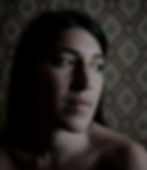Alba Zari, based in London, was born in 1987 in Bangkok, Thailand. She graduated from DAMS in Bologna, Italy in Cinema Critics and specialised in Visual Design at NABA in, and in Documentary Photography at the International Center of Photography in New York, USA. Her work THE Y, is exhibited in prestigious galleries and art centers, and has became part of the permanent collection of the Museum of Contemporary Arts in Rome in 2019.
Q: Please introduce yourself and your project briefly.
A: I am a visual artist based in London. I am the author and director of White Lies; with this film I want to trace the past of my mother and grandmother and their struggle to exist. It is a documentary film about three identities in search of reconciliation and redemption.

Alba Zari, photo from private archive
After many years away from my family and home I have realized that I need to find out the truth about my biological father. I need to know his identity. This question will unveil the hidden past of my family: my grandmother escaped from Trieste and from her husband joining the cult called the Children of God and bringing with her only my mother Ivana and leaving behind her other 2 children. I will try to find the truth about my father through denials and acceptance, through creation and re-elaboration.
Q: Why this film? What is your most important motivation?
A: In understanding the past of my family I will also reflect on the trauma and the pain that went through generations. In this way I will try to find a way to heal from trauma, abuse and neglect. This film will reflect on the pain that many women have endured by observing my mother’s and grandmother's lifes and trying to understand what happened to them when they joined a fundementalist sexual religious cult. I will try to find peace through reconciliation and acceptance.
Q: What is the biggest challenge in making this film?
A: The biggest challenge in this film is to be the protagonist and the director, to see myself from the outside in an objective way. I find this process difficult but at the same time very important. In this way I have a balanced emotional distance that allows me to process and transform my work and life at the same time.
Q: What would be the most frustrating/troubling part of filmmaking (as a woman)?
A: I enjoy very much the process of filmmaking and I like challenges, so at the moment I have not felt frustrated yet. Maybe the most difficult part is to find the right people to work with with such a delicate and intimate story but once I have built that trust, respect and intellectual honesty I feel that there will be a solid foundation.
Q: And the most rewarding one?
A: I think that the most rewarding moment will be when you find a universal way in making a film that touches everyone. In that moment the film will not belong only to yourself but to everyone and I feel that with such a personal and delicate film it will be a relief.
Q: How did the COVID-19 pandemic affect your work as a filmmaker?
A: In a very positive way: I have time to do more research and write. I find that time is a very important gift.
Q: What inspires you the most in your creative journeys?
A: Visual art, painting, books, pictures, and what surrounds me. There is a lot of beauty in everyday life.
Q: Can you compare your experience at CIRCLE with other similar platforms that you have been part of?
A: No, it's my first experience.
Q: What were the most important benefits from being part of CIRCLE program?
A: The exchange with all the people that participated, it felt like one big community. It was great to find so much support from amazing colleagues.
Q: Name your favorite woman-directed film and why.
A: For One More Hour With You. Un’ora sola ti vorrei of Alina Marazzi. I find very moving how she used her family archive and the letters she found of her mother and how she built the film using only her personal archive.
Q: Do you have a favorite documentary film? Why is it one of your favorites?
A: I find it very difficult to decide which is my favorite documentary film... Right now maybe I would say The Mouth of the Wolf of Pietro Marcello because of how he combines documentary with fiction and melancholy home movies from the past century with poetic images, sounds, and music of today.
Q: What is the most important thing for you as a spectator? What do you search/expect to find in films?
A: To get a deeper emotional understanding of one's life or situation.
Q: What advice do you have for other (female) directors?
A: To always believe in yourself and to never give up.

Still from Alba's film White Lies
